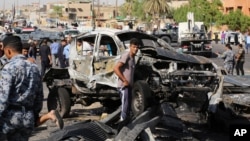Acts of terrorism and violence in Iraq killed more than 1,100 people in September, continuing what has been a particularly deadly year for the country.
The United Nations mission in Iraq reported Wednesday the toll from last month included 854 civilians and 265 members of the Iraqi Security Forces.
In the first nine months of 2014, nearly 12,000 people were killed - roughly the same number as the past two years combined.
A push by Sunni Islamist militants to take over large parts of northern and western Iraq has been a key source of the increased bloodshed, particularly in June, when nearly 900 Iraqi military personnel were killed.
The government struggled to respond under former prime minister Nouri al-Maliki. His critics blamed him for furthering sectarian tensions and failing to represent the interests of the country's Sunnis, Kurds and other minorities.
Iraq's parliament named Haider al-Abadi as Maliki’s replacement last month, just as the United States began a campaign of airstrikes to protects its interests in Iraq that later expanded to assisting Iraqi forces battling the militants from the Islamic State group.
Car bombs and other attacks have continued across Iraq, including a wave Tuesday that killed at least 35 people in mainly Shi'ite areas of Baghdad. Other bombs hit Karbala, Iskandariyah and Najaf.





